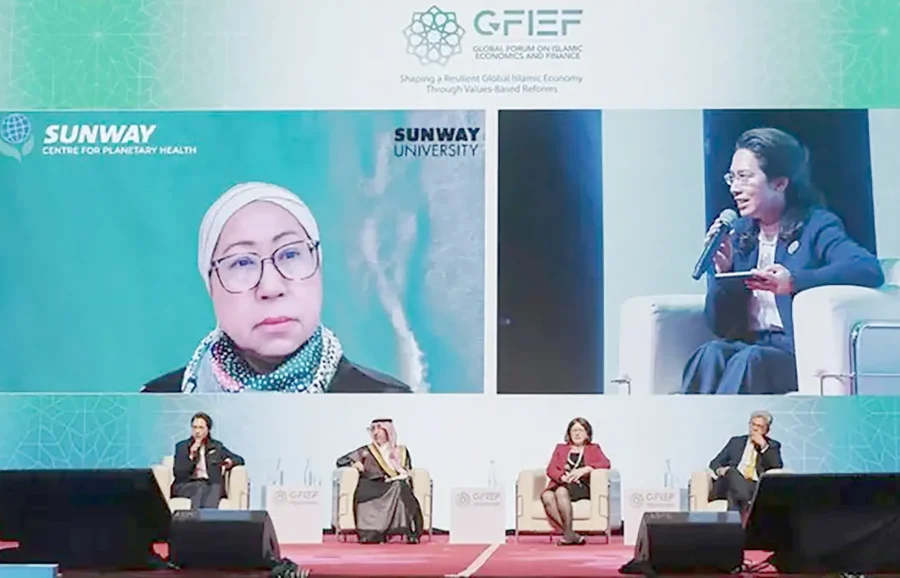Global experts from the health and financial sectors emphasised the critical role of Islamic finance in transitioning the economy towards net zero global commitments. A panel session name ‘A Just Transition towards a Shared Future’ at the Global Forum of Islamic Economics and Finance (GFIEF) explored the relationship between economic growth, inclusion, and climate action and the role of Islamic finance in driving the energy transition journey.
Sunway Centre for Planetary Health Professor and Director Tan Sri Dr. Jemilah Mahmood spoke about the urgency of addressing climate change and the inequality it exacerbates, calling for a mindset change when financing companies to transition towards ‘green’ practices.
“There needs to be a shift from the current ‘take, make, use, and lose’ economy to a regenerative and distributive model,” she said during a panel session at GFIEF 2024.
She said Islamic finance was already based on the Maqasid Shariah principle and supports financing that backs sustainable economic development and equitable wealth distribution, highlighting examples like the regenerative economic model being piloted in Perak, Malaysia.
Echoing this sentiment is Dato’ Khairussaleh Ramli, Maybank Group President and CEO, said that Islamic finance principles emphasise harm-free practices and promoting good, which naturally align with value-based financing.
He pointed to Maybank as a leading player in this area. “A significant portion of Maybank’s assets are already Islamic, and the bank leverages this foundation to support sustainable development.
“In Malaysia alone, at the end of this quarter, 70% of our financing assets are already Islamic. At the group level, it’s already 44%. And in Malaysia, we have got about 40% of the Islamic finance asset market share,” he said.
He also said that Maybank’s comprehensive strategy of ‘humanising financial services’ is a journey that
integrates sustainability into its core operations, fosters an inclusive culture internally and externally, and leverages innovative financial tools to support the global transition to a low-carbon economy.
The health and finance experts from Malaysia were joined by Dr. Fahad Ibrahim Alshathri, Deputy Governor of the Saudi Central Bank and Dame Susan Rice, Chair of the Global Steering Group, Global Ethical Finance Initiative.
The four discussed the importance of a just and equitable transition for global economic growth and social cohesion, showcasing local efforts to ensure that no community is left behind. This includes people education and development, investment in infrastructures and industries, and governance.
Maybank established an environmental, social and governance (ESG) research team for its proprietary ESG rating for equities to drive their ASEAN decarbonisation journey, while Scotland and Malaysia emphasised reskilling and upskilling their workforce with climate-related knowledge. Basing solutions on Islamic principles was a practical approach due to the alignment of values, Rice said. She also said that countries could learn from existing local transitionary solutions that indirectly practise these universal principles,
ensuring no one was abandoned or left jobless.
She cited a Scottish project she was involved in as Chair of the Forth Green Freeport, based on a green growth strategy for Scotland’s industrial corridor. This project focuses on the community’s need to be reskilled for work that harnesses new green technologies, alternative fuels and renewable energy manufacturing. She added that to support local solutions, financial players should collaborate to innovate and create tools such as hybrid financing or different types of funding, which in turn could help companies achieve their climate goals.
“You’re always competing as a business, but there are times when you need to do things together. So as a crisis, we need to do things together,” she said.
Dr. Fahad also said to integrate local solutions into the wider financial system, there must be a pragmatic solution for countries at different levels of development.
He spoke about the role of central banks which have specific mandates that vary by country, focusing on economic growth, financial stability and climate change.
“It’s crucial for central banks to balance these responsibilities, ensuring that financial policies align with their mandates while addressing broader issues such as sustainability and climate action,” he said.—Zawya










